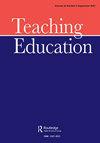Internationalization and CAEP accreditation: replicating US teacher education programs abroad
IF 1.1
Q2 EDUCATION & EDUCATIONAL RESEARCH
引用次数: 2
Abstract
ABSTRACT The Internationalization of Higher Education has led to uneasiness among non-US universities about their international reputation, ranking, and local legitimacy generating a growing interest in US accreditation. Specifically, non-US Colleges of Education pursue accreditation through the Council for the Accreditation of Educator Preparation (CAEP) to validate program quality, obtain positive recognition, and gain perceived benefits. This essay contends that under the facades of internationalization and quality assurance, CAEP uses four approaches to internationalization to replicate US teacher education programs outside US borders. The process legitimizes particular educational practices while simultaneously delegitimizing and rejecting local practices establishing teacher education programs that look and perform similar to US programs designed for an American setting. Discussion is provided that advances the conversation about IHE and accreditation including the unique consequences that emerge for non-US teacher education programs and the indigenous people and culture.国际化和CAEP认证:将美国教师教育项目复制到国外
摘要:高等教育的国际化导致非美国大学对其国际声誉、排名和当地合法性感到不安,从而对美国认证产生了越来越大的兴趣。具体而言,非美国教育学院通过教育工作者准备认证委员会(CAEP)进行认证,以验证课程质量,获得积极认可,并获得感知利益。本文认为,在国际化和质量保证的表象下,CAEP采用四种国际化方法在美国境外复制美国教师教育项目。这一过程使特定的教育实践合法化,同时剥夺和拒绝当地建立教师教育项目的合法性,这些项目看起来和表现类似于为美国环境设计的美国项目。提供了讨论,促进了关于IHE和认证的对话,包括对非美国教师教育项目以及土著人民和文化产生的独特影响。
本文章由计算机程序翻译,如有差异,请以英文原文为准。
求助全文
约1分钟内获得全文
求助全文
来源期刊

Teaching Education
EDUCATION & EDUCATIONAL RESEARCH-
CiteScore
3.80
自引率
6.20%
发文量
15
期刊介绍:
Teaching Education is an interdisciplinary forum for innovative practices and research in teacher education. Submission of manuscripts from educational researchers, teacher educators and practicing teachers is encouraged. Contributions are invited which address social and cultural, practical and theoretical aspects of teacher education in university-, college-, and school-based contexts. The journal’s focus is on the challenges and possibilities of rapid social and cultural change for teacher education and, more broadly, for the transformation of education. These challenges include: the impact of new cultures and globalisation on curriculum and pedagogy; new collaborations and partnerships between universities, schools and other social service agencies; the consequences of new community and family configurations for teachers’ work; generational and cultural change in schools and teacher education institutions; new technologies and education; and the impact of higher education policy and funding on teacher education. Manuscripts addressing critical and theory-based research or scholarly reflections and debate on contemporary issues related to teacher education, will be considered. Papers should attempt to present research, innovative theoretical and/or practical insights in relevant current literature and debate.
 求助内容:
求助内容: 应助结果提醒方式:
应助结果提醒方式:


